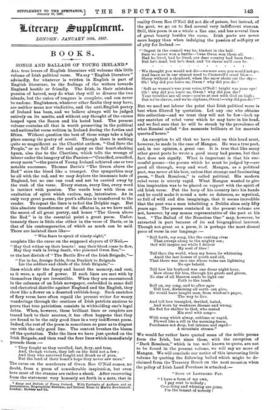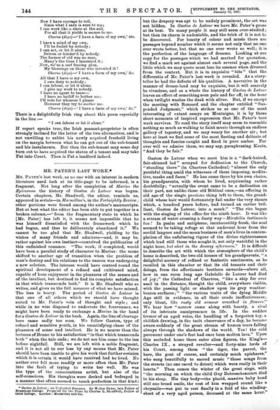BOOKS.
SONGS AND BALLADS OF YOUNG IRELAND.* ALL true lovers of English literature will welcome this little volume of Irish political verse. We say "English literature" advisedly, for whatever is written in English is part of English literature, be the feelings of the writers towards England hostile or friendly. The Irish, in their mistaken passion of hatred, may do what they will to divorce the two islands, but the union of tongues is complete, and can never be undone. Englishmen, whatever other faults they may have, are neither mean nor vindictive, and the anti-English poetry of Ireland has been, and we believe always will be judged entirely on its merits, and without any thought of the curses heaped upon the Saxon and his hated land. The present volume contains all that is worth preserving in the political and nationalist verse written in Ireland during the forties and fifties. Without question the best of these songs take a high place among the poetry of revolt. Though there is nothing quite so magnificent as the Chartist anthem, "God Save the People," or so full of fire and agony as that heart-shaking hymn, also due to the Chartists, which tells the wrongs of labour under the imagery of the Passion—" Crucified, crucified, every morn "—the poets of Young Ireland achieved one or two notable successes. Thomas Davis's "The Green above the Red" stirs the blood like a trumpet. Our sympathies may be all with the red, and we may deplore the insensate hate of England, but no one can read and not be carried away by the rush of the verse. Every stanza, every line, every word is instinct with passion. The words bear with them an exaltation of spirit which excites, nay, intoxicates. As in only very great poems, the poet's afflatus is transferred to the reader. To repeat the lines is to feel the Delphic rage. But this absolute transference of the afflatus is, as we have said, the secret of all great poetry, and hence "The Green above the Red" is in the essential point a great poem. Unfor- tunately there is little else either in the verse of Davis, or in that of his contemporaries, of which as much can be said. There are isolated lines like- " Who fears to speak of ninety-eight," couplets like the curse on the supposed slayers of O'Neil,—
" May God wither up their hearts ! may their blood cease to flow, May they walk in living death, who poisoned Owen Hoe,"—
or the last distich of "The Battle Eve of the Irish Brigade,"—
" For in far, foreign fields, from Dunkirk to Belgrade Lie the soldiers and chiefs of the Irish Brigade,"—
lines which stir the fancy and haunt the memory, and cast, as it were, a spell of power. If such lines are met with by themselves they are irresistible. When they are encountered in the columns of an Irish newspaper, embedded in some dull
and rhetorical diatribe against England and the English, they show like a flower on a deserted rubbish-heap. Such snatches of fiery verse have often repaid the present writer for weary wanderings through the orations of Irish patriots anxious to prove that true patriotism consists in withholding one's legal debts. When, however, these brilliant lines or couplets are traced back to their sources, it too often happens that they are found to be the only good lines in a very indifferent poem. Indeed, the rest of the poem is sometimes so poor as to disgust one with the only good line. The context brushes the bloom off the quotation. Take the lines we have just quoted on the
Irish Brigade, and then read the four lines which immediately precede them :—
"They fought as they revelled, fast, fiery, and true, And, though victors, they left on the field not a few ; And they who survived fought and drank as of yore, But the land of their heart's hope they never saw more."
The curse on the murderers of Owen Roe O'Neil comes, no doubt, from a poem of considerable inspiration, but even here most of the stanzas are rather a shock. After recovering from the statement very honestly set forth in a note, that in
• Songs and Ballads of Young Ireland, With Portraits of Authors and an Introduction, Biographical Sketches, and Critical Notes by Martin Macdermott. London : Downey and Co.
reality Owen Roe O'Neil did not die of poison, but instead, of the gout, we go on to find several very indifferent stanzas. Still, this poem is as a whole a fine one, and has several lines of great beauty besides the curse. Irish poets are never more happy than when indulging the passion of self-pity or of pity for Ireland :—
"' Sagest in the council was he, kindest in the hail: Sure we never won a battle—'twas Owen won them all. Had he lived, had he lived, our dear country had been free ; But he's dead, but he's dead, and 'tis slaves we'll over be.
'We thought you would not die—we were sure you would not go, And leave us in our utmost need to Cromwell's cruel blow— Sheep without a shepherd, when the snow shuts out the sky— Oh ! why did you leave us, Owen ? why did you die ?
'Soft as woman's was your voice, O'Neil' bright was your eye! Oh! why did you leave us, Owen ? why did you die ? Your troubles are all over—you're at rest with God on high ; But we're slaves, and we're orphans, Owen !—why did you die ?"
But we need not labour the point that Irish political verse is best when filtered by quotation. Let any one who obtains this collection—and we trust they will not be few—look up any snatches of rebel verse which he may have in his head, and we feel sure that he will be struck by the prevalence of what Rossini called "des moments brillants et lee mauvais quarts-d'heure."
An exception to all that we have said on this head must, however, be made in the case of Mangan. He was a true poet, and, in our opinion, a great one. It is true that like many other great poets he wrote a good many bad poems, but that fact does not signify. What is important is that his suc- cessful poems—the poems which he must be judged by—are good all through, warp and woof. Mangan, as a political poet, was never at his best, unless that strange and fascinating poem, " Dark Rosaleen," is called political. His modern rebel verse is utterly vapid. What Mangan wanted to give him inspiration was to be placed en rapport with the spirit of old Irish verse. Put the harp of his country into his hands and he could make it sound a note so dolorous, so mystical, so full of wild and dim imaginings, that it seems incredible that the poet was a man inhabiting a Dublin slum only fifty years ago. The poems contained in the present volume are not, however, by any means representative of the poet at his best. "The Ballad of the Nameless One" may, however, be extracted in part because of its sad biographical interest. Though not great as a poem, it is perhaps the most dismal piece of verse in our language :—
"Roll forth, my song, like the rushing river That sweeps along to the mighty sea; God will inspire me while I deliver My soul of thee !
Tell thou the world, when my bones lie whitening Amid the last homes of youth and eld, That there was once one whose veins ran lightning No eye beheld.
Tell how his boyhood was one drear night.hour, How shone for hint, through his griefs and gloom, No star of all Heaven sends to light our Path to the tomb.
Roll on, my song, and to after ages Tell how, disdaining all earth can give, He would have taught men, from wisdom's pages, The way to live.
And tell how trampled, derided, bated, And worn by weakness disease and wrong, He fled for shelter to God, who mated
His soul with song— With song which alway, sublime or vapid, Flowed like a nil in the morning-beam, Perchance not deep, but intense and rapid—
A mountain stream."
We would far rather have quoted some of the noble poems from the Irish, but since these, with the exception of "Dark Rosaleen," which is too well known to quote, are not to be found in the present volume, we will say no more of Mangan. We will conclude our notice of this interesting little volume by quoting the following ballad which might be de- claimed from the Treasury Bench on the next occasion when the policy of Irish Land Purchase is attacked :—
" SONG OP LANDLORD PAT.
"I have a farm of my own, I pay rent to nobody ; Crouching and whining are gone,
I'm the tenant of nobody 1
Now I have courage to toil, Since what I earn is sure to me; I can work like a slave at the soil,
For all that it yields is secure to me.
Chorus (digs)—` I have a farm of my own,' etc.
I have a mind of my own, I'll be fooled by nobody ; I can act, or let it alone, Driven or hinder'd by nobody.
The farmer of old was no man, Many's the time I lamented it ; Now we'vz a serf freeing plan, My blessings on those who invented it !
Chorus (digs)—' I have a farm of my own,' &c.
All that I have is my own, I owe duty to nobody ; I can labour, or let it alone, I give my work to nobody.
I have no agent to tease—
1 have no bailiff to bother me; I'll vote for whoever I please
However they try to soother me.
Chorus (digs)—' I have a farm of my own,' &c."
There is a delightfully Irish ring about this poem especially in the line :— " I can labour or let it alone."
If report speaks true, the Irish peasant-proprietor is often strongly inclined for the latter of the two alternatives, and is not unwilling to sublet his newly acquired freehold living on the margin between what he can get out of the sub-tenant and his instalments. But then the sub-tenant may some day turn out to have acquired the status of a tenant and may take Pat into Court. Then is Pat a landlord indeed.



















































 Previous page
Previous page